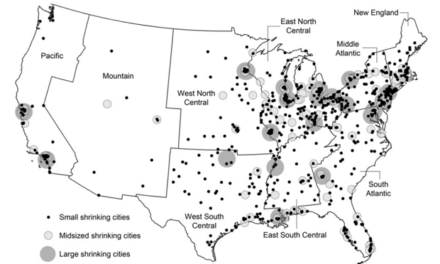Ten days ago, in the wake of the Tennessee Legislature’s decision to send the deannexation bill back for more study, we blogged that City of Memphis should begin a process to consider what the optimal size of the city should be.
A few days later, Memphis City Council Chairman Kemp Conrad did just that, proposing a city-county-state committee to decide if Memphis should voluntarily deannex part of its land area, which grew by 55% since 1970 while the population grew by 5%.
Memphis Mayor Jim Strickland has indicated that his administration is willing to work with the committee, which has one of those stultifying names government loves – Strategic Footprint Review for a Better Memphis Task Force.
The Commercial Appeal reported that a deannexation leader rolled his eyes because there were no required representatives from his area but what made us arch our eyebrows was the inclusion of county and state governments. After all, their involvement means that 60% of the members of the 10-person committee aren’t appointees of City of Memphis.
Equity Is The Answer
More to the point, we wondered why they’re even involved at this point but we trust that Chairman Conrad is a man with a plan.
We assume that all of the members are planning to be involved from the beginning, but in our opinion, the better course would be for City of Memphis to begin with a strictly Memphis-centric analysis of its finances, particularly comparing sources and uses of its revenues and determining the “net income” from each annexed area.
In its way, it’s a kind of fiscal equity study that answers the core questions:
1) Who pays?
2) Who benefits?
3) What is the most optimal philosophy for funding public services?
There’s little doubt that City of Memphis is best-equipped to make these determinations and to develop some strawmen recommendations. At that point, the results could be could be presented to Shelby County Government and county government could consider the financial implications from it. But make no mistake about it, the ultimate decision should be one focused on City of Memphis and communicated to Shelby County Government as a matter of respect and good planning.
Regional Assets Paid From Regional Tax Base
That said, our opinion would completely change if Shelby County Government came to the table willing to have a discussion about regional assets – museums and the zoo, for example – that should be moved to the broader regional tax base, which is county government’s.
It’s been almost 20 years since city and county governments agreed to enter into that kind of discussion, and back then, it unfortunately did not bear any fruit. Its implications were felt years later when City of Memphis took unilateral actions on the funding on schools and the health department, shifting them to the county’s budget.
We’re long overdue for that kind of discussion, the one about what’s a municipal service (why shouldn’t Memphis’ services be roughly consistent with the other municipalities in Shelby County) and what’s a regional, or countywide, service – and funded by the county tax base. If it were possible to undertake this kind of serious, and long overdue discussion, Chairman Conrad’s entreaties to Shelby County Government would be well worth the effort.
As for state government’s two members to the committee, we’re hard-pressed to the value they bring. After all, it was the General Assembly’s precipitous action that pushed City of Memphis to the edge of the fiscal abyss in the first place.
Scenarios For The Future
Originally, the committee was to include two City Council members appointed by Mr. Conrad, two county commissioners appointed by Shelby County Board of Commissioners Chairman Terry Roland and two representatives each appointed by Shelby County Mayor Mark Luttrell and Memphis Mayor Jim Strickland, as well as one state legislator from Shelby County appointed by state Senate Republican leader Mark Norris and one legislator appointed by state Senate Democratic leader Lee Harris, but yesterday, a Council Committee added an “industry” member and required that seven of the committee members live in Memphis. However, the majority of the members still are representing entities other than City of Memphis.
We are hopeful that the makeup of the committee does not lead it to take a distinctly political approach to an issue as important as the future footprint of Memphis. Get a group of politicians in the room, and the temptation is to begin a political negotiation rather than the rational, unbiased, nonpolitical analysis that produces the wisest possible decision. We give Chairman Conrad credit for understanding this and being alert to the fact that ultimately, this is about Memphis and should be driven by people acting for City of Memphis.
The convoluted state deannexation law makes the financial analysis even more complicated. After all, the proposed law stated that taxpayers in the deannexed area would be required to pay for the capital improvements made there by City of Memphis, and possibly pension obligations as well.
Voluntary deannexation by Memphis would forfeit that potential under current state law, so it’s no longer a simple analysis. Rather, it needs to be more of a scenario planning exercise in which all options are considered, including whether Memphis’ deannexation would be better under the proposed law.
Shrinking From The Facts
City Council member Edmund Ford has raised the salient point that some of these potential deannexation areas have also been the site for PILOT projects that received substantial City of Memphis tax waivers. It’s another consideration that City of Memphis should be given if the deannexation law is resurrected in the next legislative session.
All that said, we commend Chairman Conrad for taking the initiative and showing leadership to get a process under way that can substitute real facts for all the opinions that have swirled during this deannexation process.
We say all this while acknowledging that we first raised the question about seven years ago about whether Memphis should shrink its land area. We didn’t know the answer but we wondered whether less land area would allow Memphis to concentrate more on improving the quality of life and investing in neighborhoods in the core city, and because of it, we hoped for a city government-led process that would once and for all determine if annexation was in the best interests of all of Memphis.
Making The Main Thing The Main Thing
On May 7, 2009, we wrote: “If Memphis was a real estate business, we would say that it suffers from a low occupancy rate. If we ran a shopping center with this problem, we could spend some money making it more attractive and offering special leases, we could lose money and suck it up, or we could raise rents, but if we did, it could lead to our tenants leaving. The same goes for Memphis. We can spend a lot of money on big-time projects like an NBA arena, Beale Street Landing, and Shelby Farms Park in hopes of keeping our taxpayers in the city and attracting more. We can respond to a decrease in people by an increase in revenues in the form of property taxes, but it results in an exodus of families.
“A friend of ours offered a lesson for us. Faced with similar scenarios, he made his shopping center smaller. He consolidated the stores that are still successful and ran a smaller, more efficient and more profitable operation. So, here’s the question: if businesses can downsize, if nonprofit agencies and private institutions can downsize, if the military can downsize, why can’t cities like ours?
“We’re not saying that shrinking Memphis would be the magic answer to solving our city’s problems, but it would allow us to target our energy, our efforts and our resources to an area that allows for more efficient deployment of city services. It’s unlikely that Memphis will ever see a return to the population within the beltway that it once had, but a smaller area just may be our best chance of stabilizing things long enough to triage our problems.”
Getting It Right
On December 9, 2009, we wrote: “Memphis is a shrinking city…We’ve masked the fact by annexations that prop up our population numbers and grant us a false sense of security. As a result, we’ve side-stepped the serious discussion that is needed about whether annexation today is actually a boon to the budgets of Memphis city government and whether stretching already faltering public services over a larger area is the sound public policy for our city.
“No amount of annexation is cosmetic enough to prevent the inescapable conclusion that in pursuit of new taxes, Memphis may actually have escalated the decline of the urban center. Operating on the theory that annexation areas are the sources of much-needed new property taxes, city government has taken a decidedly optimistic viewpoint of the overall net fiscal effect. Perhaps, it’s not enough to calculate the costs of the new services to the new area. More to the point, the analysis needs to evaluate carefully and thoroughly what the impact is on services and neighborhoods in the former city limits.”
We’ve written a half dozen more times about the potential of reducing Memphis’ footprint, and hopefully, the process launched by Chairman Conrad will once and for all answer our questions and provide the facts for the wisest decisions to be made about Memphis’ future.
***
Join us at the Smart City Memphis Facebook page for daily articles, reports, and commentaries relevant to Memphis.






Let’s not negotiate with ourselves.
Memphis can shrink its fiscal footprint while maintaining or growing its geographic footprint. We can shrink services but still hold land. That is, why not prioritize everything inside the 240 loop and scale back services in some areas while still keeping them in the city? That way, Memphis cuts back on costs/raise occupancy and maintain the flexibility to expand again later without being carved up into dozens of suburbs.
In other words, can you name a specific area you would be willing to de-annex? I don’t see any names mentioned above. If the goal is to cost costs, that means de-annexing poorer than average areas because after all poor areas bring in less taxes and have higher social service costs for things like police. So, should Memphis cut Whitehaven loose? Frayser? Raleigh? Then what? Those areas incorporate on their own and just have to deal with their problems but still with Memphis debt liens attached to homes? I wouldn’t take that deal if I lived in Whitehaven. Hardly strikes me as fair. And how would that benefit the region by spinning Whitehaven out, for instance? What if it turned into Flint but with worse economies of scale?
Far better to blow out all the blight in the core and then concentrate resources there. Triage. Then if certain non-core areas start to wither naturally, services can be cut back until growth resumes and density makes them affordable again.
Nobody wants to turn the region into St. Louis or LA with an ungovernable mishmash of suburbs. Once the borders start to fragment, they’re never going to be put back together again
In the end, we think that the success of this process would be if it becomes a way to concentrate more on the core city, make more investments in quality of life, and rebuild neighborhoods. That’s the standard for us. If the results can’t produce a better way of doing that, it has not succeeded.